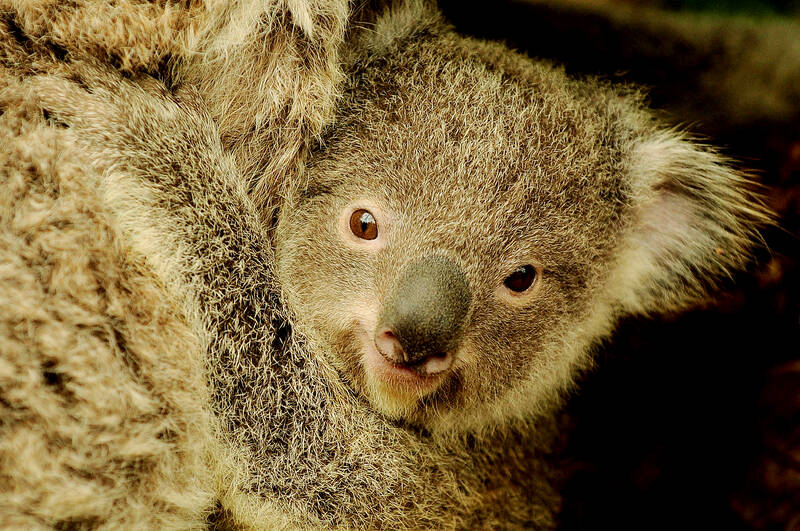Photos of Australian wildlife in bushfire recovery areas, captured and analyzed using artificial intelligence (AI), have given new insights into the journey of vulnerable species back from natural disaster.
Researchers from WWF and Conservation International teamed up with local land managers to collect more than 7 million photos from about 1,100 sensor-activated cameras in eight parts of Australia affected by bushfires in recent years.
They captured a wombat mother with her joey in the New South Wales southern ranges, a rare group of echidnas on Kangaroo Island as well as Kangaroo Island dunnarts, dingo pups in Victoria’s East Gippsland, and koalas in the Blue Mountains and southeast Queensland.

Photo: AFP
The Google AI technology, called Wildlife Insights, was trained on 4 million images of more than 150 Australian animals, and tracked their recovery in the years after bushfires.
The system initially identified wombats as pigs, and kangaroos as deer, WWF Australia’s eyes on recovery program researcher and coordinator Emma Spencer said.
However, the program can now recognize species such as kangaroos and wombats with more than 90 percent accuracy.
The cameras have been in the field in the different locations for a couple of months to three years.
Researchers were most excited about the discovery of the dunnarts on Kangaroo Island, where bushfires ravaged up to 90 percent of their habitat in 2020, Spencer said.
Images of koalas moving around on the ground indicated that the animals were still recovering from fires, she said.
“They might be needing to move around more to find new habitat. They’re moving on the ground rather than being up in trees,” she said.
“They can become a lot more vulnerable to predators when they’re moving along the ground,” she added.
The cameras also tracked a variety of invasive species including foxes, feral cats, pigs and cane toads.
The technology would make it easier to quickly identify threatened species after fires to help with the response, Spencer said.
Although the project had pointed to signs of recovery for wildlife after the last bushfire season, the potential for the next was not far away, she said.
“We’ve had three years of heavy rainfall, and in some cases we’ve actually seen big booms of animals because of that. We’ve also seen huge growth of vegetation, which means higher bushfire risk — potentially this summer,” Spencer said.
“What we’re really hoping for is that these results can help to inform future fire events, which we will expect to get a lot more of due to climate change,” she said.

Nauru has started selling passports to fund climate action, but is so far struggling to attract new citizens to the low-lying, largely barren island in the Pacific Ocean. Nauru, one of the world’s smallest nations, has a novel plan to fund its fight against climate change by selling so-called “Golden Passports.” Selling for US$105,000 each, Nauru plans to drum up more than US$5 million in the first year of the “climate resilience citizenship” program. Almost six months after the scheme opened in February, Nauru has so far approved just six applications — covering two families and four individuals. Despite the slow start —

YELLOW SHIRTS: Many protesters were associated with pro-royalist groups that had previously supported the ouster of Paetongtarn’s father, Thaksin, in 2006 Protesters rallied on Saturday in the Thai capital to demand the resignation of court-suspended Thai Prime Minister Paetongtarn Shinawatra and in support of the armed forces following a violent border dispute with Cambodia that killed more than three dozen people and displaced more than 260,000. Gathered at Bangkok’s Victory Monument despite soaring temperatures, many sang patriotic songs and listened to speeches denouncing Paetongtarn and her father, former Thai prime minister Thaksin Shinawatra, and voiced their backing of the country’s army, which has always retained substantial power in the Southeast Asian country. Police said there were about 2,000 protesters by mid-afternoon, although

MOGAMI-CLASS FRIGATES: The deal is a ‘big step toward elevating national security cooperation with Australia, which is our special strategic partner,’ a Japanese official said Australia is to upgrade its navy with 11 Mogami-class frigates built by Japan’s Mitsubishi Heavy Industries, Australian Minister for Defence Richard Marles said yesterday. Billed as Japan’s biggest defense export deal since World War II, Australia is to pay US$6 billion over the next 10 years to acquire the fleet of stealth frigates. Australia is in the midst of a major military restructure, bolstering its navy with long-range firepower in an effort to deter China. It is striving to expand its fleet of major warships from 11 to 26 over the next decade. “This is clearly the biggest defense-industry agreement that has ever

DEADLY TASTE TEST: Erin Patterson tried to kill her estranged husband three times, police said in one of the major claims not heard during her initial trial Australia’s recently convicted mushroom murderer also tried to poison her husband with bolognese pasta and chicken korma curry, according to testimony aired yesterday after a suppression order lapsed. Home cook Erin Patterson was found guilty last month of murdering her husband’s parents and elderly aunt in 2023, lacing their beef Wellington lunch with lethal death cap mushrooms. A series of potentially damning allegations about Patterson’s behavior in the lead-up to the meal were withheld from the jury to give the mother-of-two a fair trial. Supreme Court Justice Christopher Beale yesterday rejected an application to keep these allegations secret. Patterson tried to kill her